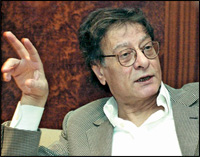 Two years ago this August the great poet and freedom fighter Mahmoud Darwish died. I had heard of Darwish, but it was watching his funeral and the days surrounding his death live on Al Jazeera as well as the reaction from the best of the solidarity movement that I was grabbed by the voice and saddened and angry that my Western ears had never heard his words before. Watching the Palestinians bury Darwish and the obvious, genuine, heart-broken grief expressed by the multitude at his funeral belied the whole Western and Zionist narrative on Palestine. What other people would bury a poet as a national leader? In Darwish the Palestinian people may have had their most effective, particularly universal, voice, but it was that particular universality of the Palestinian experience that Darwish expressed. No wonder the flowing tears in Palestine at his death. Darwish was a Palestinian and an activist; one who lived the long Palestinian reality of war and exile and betrayal and solidarity and resilience. His words spoke of the Palestinian plight (though certainly not only this), but in doing so he spoke of a world of Palestinians, a world of dispossessed and despised, the homeless and the human.
Two years ago this August the great poet and freedom fighter Mahmoud Darwish died. I had heard of Darwish, but it was watching his funeral and the days surrounding his death live on Al Jazeera as well as the reaction from the best of the solidarity movement that I was grabbed by the voice and saddened and angry that my Western ears had never heard his words before. Watching the Palestinians bury Darwish and the obvious, genuine, heart-broken grief expressed by the multitude at his funeral belied the whole Western and Zionist narrative on Palestine. What other people would bury a poet as a national leader? In Darwish the Palestinian people may have had their most effective, particularly universal, voice, but it was that particular universality of the Palestinian experience that Darwish expressed. No wonder the flowing tears in Palestine at his death. Darwish was a Palestinian and an activist; one who lived the long Palestinian reality of war and exile and betrayal and solidarity and resilience. His words spoke of the Palestinian plight (though certainly not only this), but in doing so he spoke of a world of Palestinians, a world of dispossessed and despised, the homeless and the human.
Now, every new encounter with his words leaves me wanting more and am wondering if readers might point me to definitive translations and/or particularly good volumes available in English, though I have been tempted to learn Arabic for the sole purpose of understanding Darwish as he reads aloud his poems with his melodic, almost mesmerizing (in the best possible sense of the term) cadence. I find myself listening to him speak, especially in front of large, enraptured audiences (what crowds, what respect for this poet!), though I can’t make out at all the words he says. The conveyance of those words with certain eloquence and an elegant rage requires no wordly translation, it simply exudes life and is impossible to retreat in the face of it. Even in a language I don’t understand, the sound of Darwish’s voice demands that I listen, and I can say that I have felt, at least, that I might have understood.
With the passing of Darwish, humanity lost one of its finest, most intimate voices. His words and his life are the verification that we humans might have a say in our own human nature, despite the inhuman and unnatural treatment meted out to humanity and the natural world by the ‘fallen angels of our nature’. Long may we hear it, in a thousand languages, read aloud in a million places or silently at home or in prison or both.